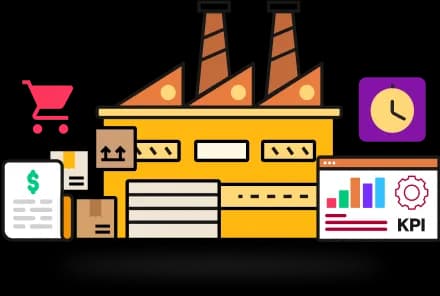Industry
Industrial Manufacturing
High Tech & Electronics
Footwear Manufacturing
Apparel & Textiles
Food & Beverage
Rubber & Plastics
Metal Fabrication
Industrial Machinery & Equipment
Construction & Engineering
Furnitures & Fixtures
Medical Device Manufacturing
Automotive Manufacturing
Aerospace And Defence
Screw Shop Manufacturing
Spring Shop Manufacturing
Solutions
Pricing
Resources
Company
Managed Increased Number Of Users Easily Legacy
ERP for SMBs
ERP for SMBs
In today’s business landscape, no business is too small for an Enterprise Resource Planning (ERP) solution. ERP allows small businesses (SMBs) to appear, act and operate like an enterprise-scale business. ERP is a strategic tool, which equips any SMB with the necessary capabilities to integrate and synchronize isolated functions into streamlined business processes.
ERP is the finest expression of the inseparability of business and information technology. ERP automates the tasks for SMBs involved in performing business processes such as order fulfillment, payments, material receipts, material requirement planning, invoicing etc., and make the same data available to all the other SMB functions immediately.
As per a renowned research firm, although awareness and current adoption of ERP is high in large organizations, it’s the SMBs that will fuel the future growth. There is big market for ERP for SMBs, given that there are over 20,000 small and mid-size companies. The awareness of the ERP concept among SMBs is less than 35%, compared to over 80% in large organizations as per a survey conducted by IDC.
A large organization can afford to implement an ERP in its entirety only because it would have the money power to do so. However, this would be a risky situation for any small or medium-sized enterprise (SMB). Implementing an ERP for SMBs would be based on the following factors:
- The number of departments in any SMB
- The cost-effectiveness of the ERP implementation for SMB
- Whether the investment in ERP would yield a profitable return for the SMB
The last factor mentioned above is of prime importance as far as any small or medium scale organization (SMB) is concerned. What small scale enterprises (SMBs) do is that, they would implement ERP for departments where it is an absolute necessity. Once the SMB makes a profit and starts to grow, then the ERP can be gradually extended to other departments as well, finally reaching the point where the ERP has been installed in the entire enterprise. Thus, implementing an ERP for SMBs can be done in stages.
Read: Inventory Management ERP Software
Strategies for successful ERP implementation in SMBs
While evaluating ERP systems, the key issues to be examined are the functional fit with the SMB’s business processes, flexibility and scalability of the ERP software, and complexity and user friendliness of the package. The other issues that SMBs should evaluate are the necessity of regular upgrades and required customizations for an ERP software.
For successful ERP implementation, SMBs need to focus on certain issues such as selecting the best cross-functional team and obtaining top management support. The SMBs also need to developing effective and open communication system, deciding the level of customization, continuous monitoring and evaluation of project performance for an ERP implementation.
What benefits do SMBs get from ERP?
- Transparency: All relevant data can be shared and accessed by all the SMB departments. This eliminates the need to export data, which can result in less errors, increased productivity and reduced expenses on human resource via the ERP software.
- Decision-making: Real-time data provided by the ERP system can be beneficial for marketing, management, accounting, and enables the SMBs to make essential decisions on time. SMB teams can detect any potential issues that may shake productivity levels via ERP. An overall picture of operations allows business leaders to make effective decisions and respond quickly with ERP tools.
- Productivity: With increased clarity by streamlined business processes, SMB staff can shift their focus on managing increased volume of business. This aids in transforming various facets of SMB business and overcoming the challenges involved in business growth.
Successful ERP implementation is a long journey towards SMB excellence. For best performance, ERP solutions should be modular, open and also comprehensive in terms of coverage and scope. The success factor for the SMBs lies in being able to put oneself in their shoes.
Get Started with Deskera
Benefits of cloud business software
- Productivity
- Implementation
- Mobility
- Scalability
- Security
What our Customers Say About Us
Whatever your business
size, Deskera enables you to
simplify operations across
business functions. Here's
what our customers say
about us.


At GoDo, we understand that managing our finances and customer relationships is essential for our success. Deskera has provided us with an easy to use and intuitive platform that has enabled us to access our financial data, track customer relationships, and manage our finances with ease. We have been able to streamline our processes, better manage our finances, and stay on top of our customer relationships. We highly recommend Deskera to any business that is looking to stay organized and efficient.
Wesley Wright
CEO, GoDo Life


We are extremely pleased with our decision to switch to Deskera and have seen a significant improvement in our business operations since making the switch. The sales process was smooth from start to finish and customer support at every step of the implementation was stellar. Highly recommend Deskera to those looking for a great ERP solution.
Wally Mears
CEO, The Jungle

We implemented Deskera's integrated platform to improve our procurement and inventory management processes to streamline our operations and improve efficiencies. I highly recommend their platform to any company looking to accelerate their growth.
Scott Phetsalod
Laboratory Manager
Run Your Business With Deskera

Products
Use Cases
 , India
, India  , Singapore
, Singapore  , and Canada
, and Canada  with
with 


